Tracy Buchanan's Blog
March 12, 2024
My new crime series is coming soon!
Really excited to let you all know Venom in the Blood, the first book in my new Dr Vanessa Marwood crime series, will be coming out in July! It's about a forensic entomologist who uses her knowledge of insects to solve gruesome crimes. I can not WAIT for you to read it and here's a little teaser for you...
If you love the sound of this, you can:
Pre-order it here: mybook.to/VenomInTheBlood
Add it as Want to Read here: Venom in the Blood
And if you love it, vote for it in this list
And here's an extract:
Prologue
There’s a trick to handling spider silk, especially when placing it into the fresh wound of a living man. Spiders have the advantage of an entire organ dedicated to the challenge. The spinneret, a cluster of nodules protruding from the abdomen like fleshy petals. Instead, we humans must use our stubby fingers for the task. One must respect the silk’s unique strength, understanding it can ensnare your fingers in mere seconds. I find performing a strange little dance with my fingers works.
This is a particular challenge right now, in the clogging heat of summer. Still so warm, even at night, as the moon casts a silvery glow over the long grass and tangled weeds before me. The chirrup of crickets seeks to distract me. The cloying stench of bluebells blurs my mind.
I take a deep breath to calm myself. Then I lift the scalpel and slice, gently, gently into the skin. I can see from the glow of my flashlight that the slit I make is barely an inch long. I wiggle the scalpel so the flesh is loosened in a way that will eventually allow the silk to fold in with grace.
There is a moan from the host as I do this, a moan that sends a shiver through me. I refuse to allow it to distract me and focus instead on replacing the scalpel with forceps, carefully extracting the silk from the phial. I take a strand between my latex‐covered thumb and forefinger. It dangles above the wound. Then I lower it towards the bloody gash, rotating my hand (the dance, remember?) so the silk disappears within the folds of flesh until all that is left is a whisper of exposed spider thread.
All done.
I stand and admire the three hosts before me, mere moments from taking their final breath. So glorious in their helpless beauty. I allow myself a few seconds to enjoy my work and then I walk away. They are no longer mine. Instead, it is time for them to be returned to the people of Greensands, and to one person in particular: Dr Vanessa Marwood.
Chapter 1
Dr Vanessa Marwood observed the lock of chestnut-brown hair before her. She liked the fact that the officers had preserved it for her. Though the fly and maggot specimens were appreciated, having something personal in her possession made the scene feel more alive in lieu of being present at the scene of the crime.
Alive seemed a strange way to describe a death scene. But death could be dynamic with all those maggots – or larvae as she preferred to call them – squirming and flies buzzing. Even this lock of hair was alive. Glossy after death. Filled with hints and clues of life. Clearly dyed, and recently too. There were no split ends either. This hair had been well cared for.
Vanessa smoothed her gloved finger over the lock. In response, the wings of a dead fly unfurled from its hiding place. Vanessa skilfully used her gold-plated forceps, a gift to celebrate her ten years at the university, to remove the decaying fly. She then placed it under the microscope. Pressing her eye against the lens, she needed a mere second to confirm it was a Calliphoridae adult or, as it is best known, a blowfly. Beneath the microscope, its metallic sheen unfolded into a network of intricate patterns, the dense complexity of its compound eyes sparkling like tiny polished gemstones.
Vanessa reached across the large aluminium table that dominated her lab for a small plastic container, and placed the specimen within on top of some lab paper to stop it growing mouldy. She then popped the lid back on and added it to the other container that had arrived from the crime scene, crammed with larvae at different stages of the life cycle, their pastel colours – white, cream and pink – giving the impression of a macabre assortment of sweets. She placed them to the side, the model of a scarab beetle her father gave her before he died watching over them like a disapproving mother. A little family of sorts, Vanessa thought.
There was a knock on the lab room door, but she ignored it, instead turning her attention to the photos she’d been sent from the crime scene. There were several of them, printed at her request to A3 size, all spread out beside her microscope.
She didn’t look at the photo of the deceased first, as other observers might. She preferred to begin by imagining them as they had once lived. So she focused on a photo of the kitchen, noticing magnetic polaroid-style frames carefully arranged on a blue Smeg fridge, all smiles and landmarks. Each featured a wavy-haired brunette who looked to be around forty, like Vanessa. The lack of any photos of children or a partner also made the two women similar. Were her reasons for having neither the same as Vanessa’s?
Unlikely.
Vanessa studied the woman’s smiling face, a face that wouldn’t seem out of place in a yoghurt advert. The laptop on the side and thick brown leather organiser hinted at a busy professional life. But from the photos on the fridge, it was clear that when the deceased wasn’t working, she made the most of her free time.
Yes, they really were similar. Except Vanessa was alive . . . and this woman was dead.
Vanessa was now ready for the photo of this woman’s last destination: her deathbed. She drew the photo towards her and sighed as she stared at the deceased woman. Her once-pretty, smiling face was in active decay stage, those rosy cheeks now blackened by putrefaction. It seemed such an insult. Death’s way of scribbling out a face in a photo. She lay at an awkward angle on top of her bed, clothed in an elegant, expensive-looking navy suit. Two apparent gunshot wounds made morbid stars in her neck and shoulder.
Vanessa studied the photos of the kitchen. Its white-tiled walls and soft pine surfaces were a crime scene investigator’s friend, making the pattern of blood on the door frames and ceiling lamp instantly stand out. There were more examples of blood matter in other photos too, spread across the walls and windows of the kitchen, hallway and bedroom of the two-bed Thameside apartment. Such a distribution of blood might suggest to less experienced eyes this was low- and medium-velocity blood spatter, implying a fight. Maybe a violent burglar was disturbed? And yet there were no other signs of a fight. No tables overturned. No broken vases. Everything was in its place. So what happened? This was where Vanessa’s unique skill set came in, called upon by the detective in charge of the case. Her thoughts
were interrupted by another knock at the door.
She reluctantly dragged her eyes away. ‘Yes?’
‘Sorry to disturb you, Doctor Marwood,’ called a soft voice. Olivia.
One of the PhD students. ‘I know you’re not to be distracted when working on a case. It’s just that he says it’s urgent.’
‘Who says it’s urgent?’ Vanessa called back through the door. ‘DCI Paul Truss. He says he’s your friend. He’s called three times now.’ Vanessa frowned. Paul Truss was an old school friend. They’d
stayed in touch during the twenty-two years since she’d moved away from their childhood village of Greensands, often having dinner when he was in London. But still, this was unexpected.
She pulled her mobile phone from the pocket of her lab coat. Ten missed calls. A WhatsApp message too. She read it.
Jesus, your staff are like the Maginot Line in France! Need your help with a case in Greensands. Serious one. CALL ME.
Serious and Greensands. Two words Vanessa didn’t like to see together. She closed her eyes and saw thistles as tall as her waist. She smelt the scent of summer so very specific to her childhood home – that intoxicating mix of arable weed petals and the rotting carcasses of baby birds pushed from their nests by magpies. She could almost feel the long grass whisper against her shins and the stern buzz of dragonfly wings in her ears. She glimpsed her brother, too, running through the grass ahead of her. One minute there, the next . . . gone. Her heart clenched as it always did when she allowed her mind to drift back in time, guilt and sadness vying for attention.
‘Doctor Marwood?’ Olivia called through the door. ‘Is everything OK?’
Vanessa snapped her eyes open, letting the memories drift away. ‘Come in, Olivia,’ she said.
The door opened and Olivia walked in, weaving between some moving boxes that were scattered around the room. She looked younger than her twenty-five years, like a juvenile deer, with her gangly legs and her soft auburn hair pulled back into a ponytail. There was a nervous look on her face as she approached the doctor. In response, Vanessa gave her a reassuring smile.
‘Holding Paul Truss off three times is impressive,’ Vanessa said. ‘He’s a persistent little bugger. I’ll call him back in a moment. But first, look at this.’
Olivia’s green eyes lit up with interest as she walked towards the table. Olivia had arrived at the university’s Forensics department the September before to focus on the influence of insects in the decomposition of charred bodies. Vanessa admired her enthusiasm. Officially, it was out of term, but here she was.
‘The context?’ Olivia asked.
‘A woman found dead with gunshot wounds in an apartment in Chelsea Harbour.’ Vanessa gestured to the photo of the kitchen, the sleeve of her lab coat riding up to expose the tattoos that crawled up her right arm. ‘What do you see?’
‘Blood spatter? Possibly from a medium-velocity impact?’ ‘Look closer. Describe it to me.’
Olivia took the dome magnifier from the side and placed it over
the middle of the spatter, leaning down to look through the glass. ‘Tadpole-like structure with random directionality.’ A satisfied smile crossed her face as it hit her. Good, Vanessa thought. She really is learning.
‘It’s not blood spatter, it’s insect speck, possibly from blowflies,’ Olivia said. ‘The flies fed on the deceased then regurgitated the blood later around the apartment, giving the impression of blood spatter.’
Vanessa nodded, feeling her own sense of satisfaction at watching a junior research assistant learn so quickly. ‘Got it in one.’
‘So what does this mean?’
‘It’s not really our job to answer that question. But between you and me, I think it’s more than likely that this woman’s life was taken by an execution-style shooting rather than the surprise attack the blood distribution first suggested.’
Olivia raised an eyebrow. ‘Execution. But that’s usually associated with drug crimes.’
‘Hmmm. It is, isn’t it?’ They both looked at the smiling photos of the pretty woman on the fridge again.
Vanessa sighed. ‘As I said, luckily it’s not our job to figure out the whys, which is just as well as I have an impatient friend to call back. You’ve had your lunch break already, right?’
Olivia nodded.
‘I’ll take my break now.’
‘You must be starving,’ Olivia remarked.
‘Don’t worry. I’ll make up for it this evening with a wildly
extravagant airport dinner. These curves don’t come from nowhere.’ Olivia’s face dropped. ‘It’s a shame you’re leaving. I get why. The New York lab looks amazing. But—’ She shrugged. ‘We’ll miss you.’ Vanessa looked around her at the tired lab and the hints of the past ten years: photos of her with students and other academics at various gatherings as her laptop’s screensaver. Small gifts of thanks she’d received too: various lab notebooks, usually insect-themed. A cute stopwatch shaped like a ladybug. Yep, she would miss this place too. But the job offer to lead entomology at a brand-new forensics lab in New York was just too much to resist. As much as she loved academic life, it was time for a change. And she’d always loved the idea of living in New York. Her mother had gone to art school there, and Vanessa had always been fascinated by her stories and the old
photos she had of her time there.
‘I’ll miss you all, too,’ she said. ‘At least you’ll have a contact if ever
you want a job in New York, right?’ Vanessa shrugged her lab coat off and replaced it with the vintage cherry-patterned raincoat she’d found at a boutique online the week before. As she got to the door of the lab, she paused and turned back towards Olivia. ‘In fact, why don’t you have a go at writing a draft of the report yourself? Only if you have time, and want to.’
The young student’s face lit up. ‘Absolutely!’
Vanessa smiled. The girl’s response brought back memories of how it felt when her own mentor, Professor Cornisen, had asked her to advise on a case while she was studying for her PhD fifteen years ago.
‘Obviously, we’ll go through it together after,’ Vanessa said. ‘It’ll be a good learning exercise. You’ll find all the details in the shared area entitled Hafferty. There are more photos in there. Print them out and track the movement of the flies from the deceased throughout the house so we get a more holistic view.’
Vanessa strode to the door, and down the corridor, the square heels of her black Mary Janes signalling to any other colleagues spending their summer months researching that she was passing by. Many looked up, some waving through their glass-fronted labs. Before leaving the floor, she ducked into the break room and grabbed the two fish cutlets she’d made, using her mother’s old Sri Lankan recipes, from the fridge.
When she stepped out of the tall grey building that housed the university, she pulled her hood up and dashed across the drenched road towards a small garden square. Relieved to find the bench where she often sat was free, she spent a moment breathing in the rain-soaked air. Petrichor was the proper term. Caused by the impact of raindrops on porous surfaces like grass and plants, inviting that exquisitely scented aerosol to rise. She unwrapped one of the cutlets and took a quick bite before returning Paul’s call.
‘Vanessa!’ His familiar voice exploded from the earpiece. ‘You took your time.’
She was instantly wrenched from the grey of the city and back into the greens and yellows of Greensands as birdsong and breeze sounded out in the background of his call.
‘Bugs? You there?’
Bugs. Not exactly original, but it was a nickname that had stuck since that day in primary school when she’d kicked him for killing a woodlouse in the playground.
‘Yes, I’m here,’ Vanessa responded as she went to take another bite of her cutlet. ‘I had a job on, you impatient twit. What’s going on?’
‘We’ve found three bodies on the grounds of the old butterfly farm.’
Vanessa sucked in a breath and carefully placed the cutlet back in its container. She didn’t have an appetite anymore. ‘Who?’
‘Remember Michael Regan?’
Michael’s freckled face swarmed into Vanessa’s mind. ‘Of course I do. He’s Sharon’s son. He used to work in the butterfly farm’s gift shop. My God, poor Sharon. Who else?’
‘Simon Taylor. He worked in the café? And then Tim Holmes, he used to drive the truck.’
Vanessa remembered them all. A few years older than her, all young men at the time, working at the butterfly farm together.
‘How did they die?’ she asked.
‘We don’t know yet. No obvious signs except . . .’ Paul sighed. ‘There were small slits cut into the men’s stomachs, just below their belly buttons. And we found something in the wounds. It’s the reason I’m calling you.’
Vanessa’s nerves tingled. ‘Tell me.’
‘I swear it’s spider’s silk.’
Vanessa found she couldn’t speak for a moment.
‘Vanessa?’
She snapped out of her reverie. ‘Are you sure? Has it been tested?’ ‘Not yet. But I’ve been around you long enough to know spider
silk when I see it. We need you here.’
‘Paul, I’m flying to New York tonight.’
‘Jesus. Has it come around that quick?’ Paul hadn’t been
delighted when she’d told him the news. The offer of free New York accommodation for him, his wife and their twin girls whenever they wanted it wasn’t enough to bring him around, either. The idea of them living in different countries, in different time zones, seemed to pain him. She understood. But she had to move on.
‘If you need a spider expert, I can recommend one,’ she said, trying not to dwell on that pain. ‘I know another great forensic entomologist, too. He’s on the NCA database, actually.’
‘Come on, are you serious? It has to be you, Vanessa.’
‘But this isn’t the way it’s done, Paul. You can’t just make a phone call and I turn up. There are official channels.’
‘Bollocks to the official channels!’ Paul shouted.
Vanessa pressed her fingers into her temples as they throbbed. ‘I know what this is about,’ Paul said, voice softening. ‘I know how
hard it’ll be to come back.’
‘Come back to Greensands? Paul, I have a British Airways flight booked this evening, and I’m picking up the keys to my new apartment tomorrow afternoon.’
‘When does your job start?’
‘Next week, but—’
‘That’s plenty of time. Delay your flight by a couple of days. I’ll
even pay the bloody British Airways service charge if there is one.’ ‘Helen will love you for that,’ Vanessa said, referring to his wife. ‘I don’t care. I need you, Vanessa. The families of these three men
need you. Sharon needs you. It can’t be anyone else. It has to be you.’ Vanessa closed her eyes. She knew he was right.
‘Fine,’ she blurted, before she could regret it. ‘I’ll be there in three
hours. Do not move the bodies.’
After she hung up, Vanessa watched a bee sucking pollen up
from a meadow cranesbill plant, trapping it in the small sac in its stomach. She hadn’t thought Greensands had much more to take from her. But it looked like she’d been wrong.
If you love the sound of this, you can:
Pre-order it here: mybook.to/VenomInTheBlood
Add it as Want to Read here: Venom in the Blood
And if you love it, vote for it in this list
And here's an extract:
Prologue
There’s a trick to handling spider silk, especially when placing it into the fresh wound of a living man. Spiders have the advantage of an entire organ dedicated to the challenge. The spinneret, a cluster of nodules protruding from the abdomen like fleshy petals. Instead, we humans must use our stubby fingers for the task. One must respect the silk’s unique strength, understanding it can ensnare your fingers in mere seconds. I find performing a strange little dance with my fingers works.
This is a particular challenge right now, in the clogging heat of summer. Still so warm, even at night, as the moon casts a silvery glow over the long grass and tangled weeds before me. The chirrup of crickets seeks to distract me. The cloying stench of bluebells blurs my mind.
I take a deep breath to calm myself. Then I lift the scalpel and slice, gently, gently into the skin. I can see from the glow of my flashlight that the slit I make is barely an inch long. I wiggle the scalpel so the flesh is loosened in a way that will eventually allow the silk to fold in with grace.
There is a moan from the host as I do this, a moan that sends a shiver through me. I refuse to allow it to distract me and focus instead on replacing the scalpel with forceps, carefully extracting the silk from the phial. I take a strand between my latex‐covered thumb and forefinger. It dangles above the wound. Then I lower it towards the bloody gash, rotating my hand (the dance, remember?) so the silk disappears within the folds of flesh until all that is left is a whisper of exposed spider thread.
All done.
I stand and admire the three hosts before me, mere moments from taking their final breath. So glorious in their helpless beauty. I allow myself a few seconds to enjoy my work and then I walk away. They are no longer mine. Instead, it is time for them to be returned to the people of Greensands, and to one person in particular: Dr Vanessa Marwood.
Chapter 1
Dr Vanessa Marwood observed the lock of chestnut-brown hair before her. She liked the fact that the officers had preserved it for her. Though the fly and maggot specimens were appreciated, having something personal in her possession made the scene feel more alive in lieu of being present at the scene of the crime.
Alive seemed a strange way to describe a death scene. But death could be dynamic with all those maggots – or larvae as she preferred to call them – squirming and flies buzzing. Even this lock of hair was alive. Glossy after death. Filled with hints and clues of life. Clearly dyed, and recently too. There were no split ends either. This hair had been well cared for.
Vanessa smoothed her gloved finger over the lock. In response, the wings of a dead fly unfurled from its hiding place. Vanessa skilfully used her gold-plated forceps, a gift to celebrate her ten years at the university, to remove the decaying fly. She then placed it under the microscope. Pressing her eye against the lens, she needed a mere second to confirm it was a Calliphoridae adult or, as it is best known, a blowfly. Beneath the microscope, its metallic sheen unfolded into a network of intricate patterns, the dense complexity of its compound eyes sparkling like tiny polished gemstones.
Vanessa reached across the large aluminium table that dominated her lab for a small plastic container, and placed the specimen within on top of some lab paper to stop it growing mouldy. She then popped the lid back on and added it to the other container that had arrived from the crime scene, crammed with larvae at different stages of the life cycle, their pastel colours – white, cream and pink – giving the impression of a macabre assortment of sweets. She placed them to the side, the model of a scarab beetle her father gave her before he died watching over them like a disapproving mother. A little family of sorts, Vanessa thought.
There was a knock on the lab room door, but she ignored it, instead turning her attention to the photos she’d been sent from the crime scene. There were several of them, printed at her request to A3 size, all spread out beside her microscope.
She didn’t look at the photo of the deceased first, as other observers might. She preferred to begin by imagining them as they had once lived. So she focused on a photo of the kitchen, noticing magnetic polaroid-style frames carefully arranged on a blue Smeg fridge, all smiles and landmarks. Each featured a wavy-haired brunette who looked to be around forty, like Vanessa. The lack of any photos of children or a partner also made the two women similar. Were her reasons for having neither the same as Vanessa’s?
Unlikely.
Vanessa studied the woman’s smiling face, a face that wouldn’t seem out of place in a yoghurt advert. The laptop on the side and thick brown leather organiser hinted at a busy professional life. But from the photos on the fridge, it was clear that when the deceased wasn’t working, she made the most of her free time.
Yes, they really were similar. Except Vanessa was alive . . . and this woman was dead.
Vanessa was now ready for the photo of this woman’s last destination: her deathbed. She drew the photo towards her and sighed as she stared at the deceased woman. Her once-pretty, smiling face was in active decay stage, those rosy cheeks now blackened by putrefaction. It seemed such an insult. Death’s way of scribbling out a face in a photo. She lay at an awkward angle on top of her bed, clothed in an elegant, expensive-looking navy suit. Two apparent gunshot wounds made morbid stars in her neck and shoulder.
Vanessa studied the photos of the kitchen. Its white-tiled walls and soft pine surfaces were a crime scene investigator’s friend, making the pattern of blood on the door frames and ceiling lamp instantly stand out. There were more examples of blood matter in other photos too, spread across the walls and windows of the kitchen, hallway and bedroom of the two-bed Thameside apartment. Such a distribution of blood might suggest to less experienced eyes this was low- and medium-velocity blood spatter, implying a fight. Maybe a violent burglar was disturbed? And yet there were no other signs of a fight. No tables overturned. No broken vases. Everything was in its place. So what happened? This was where Vanessa’s unique skill set came in, called upon by the detective in charge of the case. Her thoughts
were interrupted by another knock at the door.
She reluctantly dragged her eyes away. ‘Yes?’
‘Sorry to disturb you, Doctor Marwood,’ called a soft voice. Olivia.
One of the PhD students. ‘I know you’re not to be distracted when working on a case. It’s just that he says it’s urgent.’
‘Who says it’s urgent?’ Vanessa called back through the door. ‘DCI Paul Truss. He says he’s your friend. He’s called three times now.’ Vanessa frowned. Paul Truss was an old school friend. They’d
stayed in touch during the twenty-two years since she’d moved away from their childhood village of Greensands, often having dinner when he was in London. But still, this was unexpected.
She pulled her mobile phone from the pocket of her lab coat. Ten missed calls. A WhatsApp message too. She read it.
Jesus, your staff are like the Maginot Line in France! Need your help with a case in Greensands. Serious one. CALL ME.
Serious and Greensands. Two words Vanessa didn’t like to see together. She closed her eyes and saw thistles as tall as her waist. She smelt the scent of summer so very specific to her childhood home – that intoxicating mix of arable weed petals and the rotting carcasses of baby birds pushed from their nests by magpies. She could almost feel the long grass whisper against her shins and the stern buzz of dragonfly wings in her ears. She glimpsed her brother, too, running through the grass ahead of her. One minute there, the next . . . gone. Her heart clenched as it always did when she allowed her mind to drift back in time, guilt and sadness vying for attention.
‘Doctor Marwood?’ Olivia called through the door. ‘Is everything OK?’
Vanessa snapped her eyes open, letting the memories drift away. ‘Come in, Olivia,’ she said.
The door opened and Olivia walked in, weaving between some moving boxes that were scattered around the room. She looked younger than her twenty-five years, like a juvenile deer, with her gangly legs and her soft auburn hair pulled back into a ponytail. There was a nervous look on her face as she approached the doctor. In response, Vanessa gave her a reassuring smile.
‘Holding Paul Truss off three times is impressive,’ Vanessa said. ‘He’s a persistent little bugger. I’ll call him back in a moment. But first, look at this.’
Olivia’s green eyes lit up with interest as she walked towards the table. Olivia had arrived at the university’s Forensics department the September before to focus on the influence of insects in the decomposition of charred bodies. Vanessa admired her enthusiasm. Officially, it was out of term, but here she was.
‘The context?’ Olivia asked.
‘A woman found dead with gunshot wounds in an apartment in Chelsea Harbour.’ Vanessa gestured to the photo of the kitchen, the sleeve of her lab coat riding up to expose the tattoos that crawled up her right arm. ‘What do you see?’
‘Blood spatter? Possibly from a medium-velocity impact?’ ‘Look closer. Describe it to me.’
Olivia took the dome magnifier from the side and placed it over
the middle of the spatter, leaning down to look through the glass. ‘Tadpole-like structure with random directionality.’ A satisfied smile crossed her face as it hit her. Good, Vanessa thought. She really is learning.
‘It’s not blood spatter, it’s insect speck, possibly from blowflies,’ Olivia said. ‘The flies fed on the deceased then regurgitated the blood later around the apartment, giving the impression of blood spatter.’
Vanessa nodded, feeling her own sense of satisfaction at watching a junior research assistant learn so quickly. ‘Got it in one.’
‘So what does this mean?’
‘It’s not really our job to answer that question. But between you and me, I think it’s more than likely that this woman’s life was taken by an execution-style shooting rather than the surprise attack the blood distribution first suggested.’
Olivia raised an eyebrow. ‘Execution. But that’s usually associated with drug crimes.’
‘Hmmm. It is, isn’t it?’ They both looked at the smiling photos of the pretty woman on the fridge again.
Vanessa sighed. ‘As I said, luckily it’s not our job to figure out the whys, which is just as well as I have an impatient friend to call back. You’ve had your lunch break already, right?’
Olivia nodded.
‘I’ll take my break now.’
‘You must be starving,’ Olivia remarked.
‘Don’t worry. I’ll make up for it this evening with a wildly
extravagant airport dinner. These curves don’t come from nowhere.’ Olivia’s face dropped. ‘It’s a shame you’re leaving. I get why. The New York lab looks amazing. But—’ She shrugged. ‘We’ll miss you.’ Vanessa looked around her at the tired lab and the hints of the past ten years: photos of her with students and other academics at various gatherings as her laptop’s screensaver. Small gifts of thanks she’d received too: various lab notebooks, usually insect-themed. A cute stopwatch shaped like a ladybug. Yep, she would miss this place too. But the job offer to lead entomology at a brand-new forensics lab in New York was just too much to resist. As much as she loved academic life, it was time for a change. And she’d always loved the idea of living in New York. Her mother had gone to art school there, and Vanessa had always been fascinated by her stories and the old
photos she had of her time there.
‘I’ll miss you all, too,’ she said. ‘At least you’ll have a contact if ever
you want a job in New York, right?’ Vanessa shrugged her lab coat off and replaced it with the vintage cherry-patterned raincoat she’d found at a boutique online the week before. As she got to the door of the lab, she paused and turned back towards Olivia. ‘In fact, why don’t you have a go at writing a draft of the report yourself? Only if you have time, and want to.’
The young student’s face lit up. ‘Absolutely!’
Vanessa smiled. The girl’s response brought back memories of how it felt when her own mentor, Professor Cornisen, had asked her to advise on a case while she was studying for her PhD fifteen years ago.
‘Obviously, we’ll go through it together after,’ Vanessa said. ‘It’ll be a good learning exercise. You’ll find all the details in the shared area entitled Hafferty. There are more photos in there. Print them out and track the movement of the flies from the deceased throughout the house so we get a more holistic view.’
Vanessa strode to the door, and down the corridor, the square heels of her black Mary Janes signalling to any other colleagues spending their summer months researching that she was passing by. Many looked up, some waving through their glass-fronted labs. Before leaving the floor, she ducked into the break room and grabbed the two fish cutlets she’d made, using her mother’s old Sri Lankan recipes, from the fridge.
When she stepped out of the tall grey building that housed the university, she pulled her hood up and dashed across the drenched road towards a small garden square. Relieved to find the bench where she often sat was free, she spent a moment breathing in the rain-soaked air. Petrichor was the proper term. Caused by the impact of raindrops on porous surfaces like grass and plants, inviting that exquisitely scented aerosol to rise. She unwrapped one of the cutlets and took a quick bite before returning Paul’s call.
‘Vanessa!’ His familiar voice exploded from the earpiece. ‘You took your time.’
She was instantly wrenched from the grey of the city and back into the greens and yellows of Greensands as birdsong and breeze sounded out in the background of his call.
‘Bugs? You there?’
Bugs. Not exactly original, but it was a nickname that had stuck since that day in primary school when she’d kicked him for killing a woodlouse in the playground.
‘Yes, I’m here,’ Vanessa responded as she went to take another bite of her cutlet. ‘I had a job on, you impatient twit. What’s going on?’
‘We’ve found three bodies on the grounds of the old butterfly farm.’
Vanessa sucked in a breath and carefully placed the cutlet back in its container. She didn’t have an appetite anymore. ‘Who?’
‘Remember Michael Regan?’
Michael’s freckled face swarmed into Vanessa’s mind. ‘Of course I do. He’s Sharon’s son. He used to work in the butterfly farm’s gift shop. My God, poor Sharon. Who else?’
‘Simon Taylor. He worked in the café? And then Tim Holmes, he used to drive the truck.’
Vanessa remembered them all. A few years older than her, all young men at the time, working at the butterfly farm together.
‘How did they die?’ she asked.
‘We don’t know yet. No obvious signs except . . .’ Paul sighed. ‘There were small slits cut into the men’s stomachs, just below their belly buttons. And we found something in the wounds. It’s the reason I’m calling you.’
Vanessa’s nerves tingled. ‘Tell me.’
‘I swear it’s spider’s silk.’
Vanessa found she couldn’t speak for a moment.
‘Vanessa?’
She snapped out of her reverie. ‘Are you sure? Has it been tested?’ ‘Not yet. But I’ve been around you long enough to know spider
silk when I see it. We need you here.’
‘Paul, I’m flying to New York tonight.’
‘Jesus. Has it come around that quick?’ Paul hadn’t been
delighted when she’d told him the news. The offer of free New York accommodation for him, his wife and their twin girls whenever they wanted it wasn’t enough to bring him around, either. The idea of them living in different countries, in different time zones, seemed to pain him. She understood. But she had to move on.
‘If you need a spider expert, I can recommend one,’ she said, trying not to dwell on that pain. ‘I know another great forensic entomologist, too. He’s on the NCA database, actually.’
‘Come on, are you serious? It has to be you, Vanessa.’
‘But this isn’t the way it’s done, Paul. You can’t just make a phone call and I turn up. There are official channels.’
‘Bollocks to the official channels!’ Paul shouted.
Vanessa pressed her fingers into her temples as they throbbed. ‘I know what this is about,’ Paul said, voice softening. ‘I know how
hard it’ll be to come back.’
‘Come back to Greensands? Paul, I have a British Airways flight booked this evening, and I’m picking up the keys to my new apartment tomorrow afternoon.’
‘When does your job start?’
‘Next week, but—’
‘That’s plenty of time. Delay your flight by a couple of days. I’ll
even pay the bloody British Airways service charge if there is one.’ ‘Helen will love you for that,’ Vanessa said, referring to his wife. ‘I don’t care. I need you, Vanessa. The families of these three men
need you. Sharon needs you. It can’t be anyone else. It has to be you.’ Vanessa closed her eyes. She knew he was right.
‘Fine,’ she blurted, before she could regret it. ‘I’ll be there in three
hours. Do not move the bodies.’
After she hung up, Vanessa watched a bee sucking pollen up
from a meadow cranesbill plant, trapping it in the small sac in its stomach. She hadn’t thought Greensands had much more to take from her. But it looked like she’d been wrong.
Published on March 12, 2024 12:00
November 7, 2022
Secrets between friends
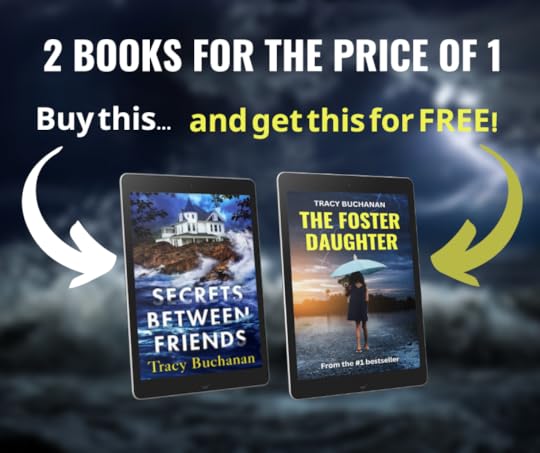 I can't believe I'm writing this: my TENTH novel, Secrets Between Friends, has been published! Even more exciting, at the end of the book, I've included an offer. All readers will find a link to download a second novel...FOR FREE! So if you fancy this awesome limited 2-for-1 offer,
head on over to Amazon
to download Secrets Between Friends.
I can't believe I'm writing this: my TENTH novel, Secrets Between Friends, has been published! Even more exciting, at the end of the book, I've included an offer. All readers will find a link to download a second novel...FOR FREE! So if you fancy this awesome limited 2-for-1 offer,
head on over to Amazon
to download Secrets Between Friends. I've been really delighted so far with the response to Secrets Between Friends. "An unputdownable mix of murder, intrigue, friendships, toxic relatives, suspense and lots of unexpected twists," is how one reviewer puts it. " "A stunningly written book, chock full of descriptive and gorgeous poetic prose," says another.
This means a lot, especially because I wrote Secrets Between Friends at the absolute worst time of my life: after the death of my beloved mum. I actually rewrote it, delaying the publication date as it was such a hot mess, understandably. Writing through grief is SO hard but it's also a saviour in a way. Writing has always been something I turn to as a form of solace. And it's not like 'writing through grief' is now over for me. I am always grieving, always feeling that big Mum-shaped gaping hole left behind. But I am learning to write around that hole and while it's so tough–the fact is, I'm a different person now–I hope the hugely positive reaction to my latest novel shows it's working out, somehow.
Anyway, I hope you benefit from this great offer. I know times are tough but reading is a solace, like writing is to me. So getting two books for the price of one is my little gift to you. But be quick: this offer won't last forever! Start reading Secrets Between Friends
Published on November 07, 2022 03:01
March 24, 2021
The Sunny Spot
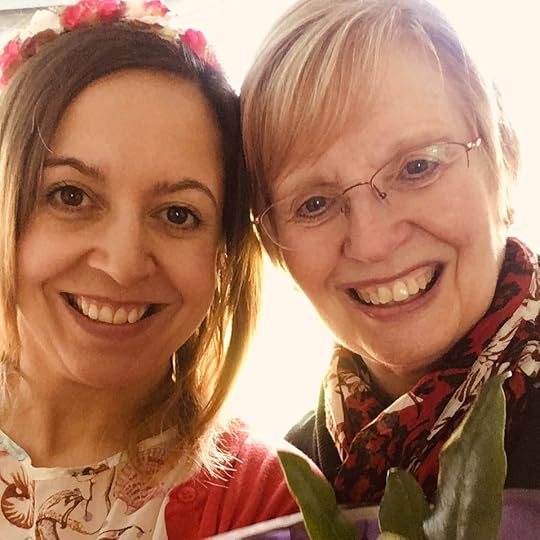 As many of my readers will know from reading the acknowledgments and dedications of my books, the biggest inspiration of my life is my mum. Sadly, she passed away nearly four weeks ago after being diagnosed with lung cancer. Here is something I wrote about her:
As many of my readers will know from reading the acknowledgments and dedications of my books, the biggest inspiration of my life is my mum. Sadly, she passed away nearly four weeks ago after being diagnosed with lung cancer. Here is something I wrote about her:THE SUNNY SPOT
You know how there's always a sunny spot in gardens where you’re guaranteed to catch the sun's best rays?
Being with Mum was like sitting in that sunny spot. That patch of pure, perfect light that bathed us all in the most delicious warmth.
It’s a warmth that enveloped my brother Paul and I as we grew up, both of us so blessed to flourish beneath Mum, the loveliest of sun beams. Curled up on the sofa watching TV with her arms around us, or sitting in the garden arm to arm, she was the centre that gave us unconditional stability and happiness.
As a big sister to Laura, Mum was like the softest, warmest of cardigans, wrapped close and always looking out for her. When the two of them were together, that warmth burst into a giggling, cheeky, loving explosion of fun which has been passed down the generations.
In her husband Vic, she found another source of light, a calming, warming presence who made her feel the sense of contentment and stability she so deserved, there right until the very end. As she told me only a few days before she passed, he was her rock, her comfort blanket.
For her precious grandchildren, that light in her beams right out of them and will continue to beam through all the generations to come. She was the best ‘little nanny’ there could be, always ready with cuddles, giggles and chocolate!
The thing is, that warmth of mum’s stretched out far and wide, always able to find that sweet spot of conversation – whether it was American politics or the latest episode of Keeping Up With the Kardashians – and make people feel natural and at ease.
She has always been our sun, our warmth. Truly the best mother a daughter and son could have. The best wife. The best 'little nanny. The best sister, aunt, cousin, friend... and daughter, too, to two wonderful parents who we hope are embracing her right now.
Now she is gone and we all feel like the Earth without its sun, the centre we once circled gone.
But I know it will all be okay because even when it’s winter and that sunny spot in your garden is gone, if you close your eyes and think about it, you can feel its warmth, can’t you? You can feel how relaxed and happy it makes you feel even on the coldest and darkest of days.
That’s just like what Mum will be to us, that perpetual sunny spot who we were all so blessed to be able to draw warmth from for so many years. And now, next time you sit in a sunny spot, or even think of that spot, remember the sunny Dot we were so blessed to have in our lives.
Published on March 24, 2021 07:24
January 8, 2021
Writing and Learning During a Pandemic
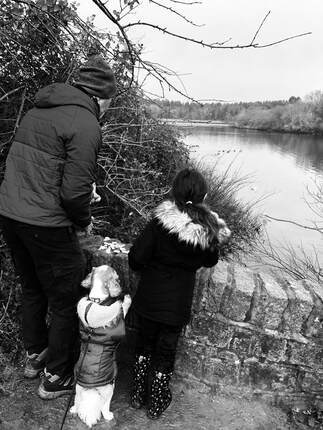 Well, what a time for us all, hey? Usually I never quite know what my readers are up to. You’re all so different and spread all over the world, it's hard to predict. But for the first time, I know with certainty we've all faced the same thing: a global pandemic. And while I have been blessed in many ways (I have not caught Covid-19 nor lost anyone as a result of it) I have had my own personal battles, and have come out feeling battered and bruised.
Well, what a time for us all, hey? Usually I never quite know what my readers are up to. You’re all so different and spread all over the world, it's hard to predict. But for the first time, I know with certainty we've all faced the same thing: a global pandemic. And while I have been blessed in many ways (I have not caught Covid-19 nor lost anyone as a result of it) I have had my own personal battles, and have come out feeling battered and bruised.As for the writing side of my life, many people have asked what it's been like to write during a pandemic. Other than the obvious, what I struggled with most was what I call ‘spinning head syndrome’. This pandemic really does put your mind in a spin. Even those who haven't been impacted in ways others have, it messes with your mind, right?
This spinning mind syndrome is particularly hard for creatives. We need focused time to dream up our ideas. We need to be able to push away outside distractions to sink into the writing process. Let me tell you, that's been near on impossible the past few months.
And yet at the same time, I have learnt SO many lessons from this pandemic about us as humans, lessons I can now plough into my writing in the future.
Take my latest novel, Circle of Doubt . It focuses on Emma, a woman whose dreams came true nine years before when she adopted her daughter, Isla. But then one day a new family moves into Forest Grove—and Emma can’t shake the chilling feeling that the wife looks just like Isla’s birth mother. Is this woman there to take Emma's daughter away... or is Emma losing her mind?
At the core of the novel is a Facebook group for mothers with a mixture of different types of members. What's been fascinating as I've revised this novel during the pandemic is watching how these ‘different camps’ have played out in real life during the pandemic.
Emma is part of what I’d call the 'lead with love' camp. The first instinct of members of this camp is to offer help to friends and family during tough times. Yes, there is anger and disappointment but ultimately, their ethos is one of compassion and positivity.
Then there is the ‘lead with anger’ camp. In this camp, opinions come before compassion. Members of this camp may well share the same views as people in the other camp, but angrily express those views before offering a helping hand or word of comfort.
In Circle of Doubt, as Emma navigates the demands of a holding down a full-time job and being a mother, she finds herself contending with the camp that leads with anger. She becomes a victim of their judgement and a sense of superiority. The irony is, these people might bemoan bullying at school, for example, and yet they are themselves bullies. They just don't see it in themselves.
What about in real life?
The good news is, many people I know lead first with love, showing a sensitivity and empathy for the challenges of those around them regardless of any opinions they might have about this pandemic.
When I say ‘opinions’ I mean the ones we see play out on our social media feeds, between those who think the reaction to the pandemic is a big exaggeration and those who think anyone who dares even step outside their house without a mask on is a criminal. That's fine, we all have our different views, that's life.
The difference between the two camps though is that regardless of which end of the scale these people’s opinions lie, people in the 'lead with love' camp don’t let those opinions cloud their compassion. But those in the 'lead with anger' camp do.
You’ll recognise them by how, when a new virus development happens (someone they know testing positive or a national lockdown is announced) rather than genuinely checking in with how their friends and family are doing, will instead spend time expressing their angry opinions (hint: their posts and rants usually include the words ‘sheeple!’ and ‘brainwashed’; ‘covidiots’ and ‘moronavirus!).
There's nothing wrong with expressing opinions. But the issue comes when someone doesn’t stop to think about the impact their words will have on someone who's reading or listening to them. They don't start with love and compassion first.
Is it really the right thing to mock people for being genuinely scared, without a thought for the clinically vulnerable who might be listening / reading (or those with clinically vulnerable members of the family). Is it right to call families going to the beach in the summer covidiots without a thought for the exhausted mother who just wanted to take her kids away for the day without breaking any rules?
Some might argue people shouldn't have to censor their views for fear of hurting someone's feelings. But what harm is there in a moment's pause first? Or an act of compassion to counter it?
Often in this case, people will say 'well you should have said'. But when dealing with such an emotionally awful time, people often can't find the reserves to express what they're thinking. It's easier to nod along, something Emma finds herself doing sometimes.
And guess what? I've been in that 'lead with anger' camp before. It's a tempting place to be when you're going through a terrible time. We all have our own reasons for being the way we are; for finding ourselves in the camps we do, like the people in Circle of Doubt. But if you try to find yoursef back to the 'lead with love' camp, it's amazing what a difference it makes.
And part of being in the 'leading with love' camp is remembering, as always with people, real and fictional, nothing is ever quite as simple as it seems. And that’s the same with all my books. You never quite know what’s going on beneath the surface…
To read my latest novel, Circle of Doubt, click the button below. Read Circle of Doubt
Published on January 08, 2021 04:39
February 28, 2020
Why I wrote Wall of Silence
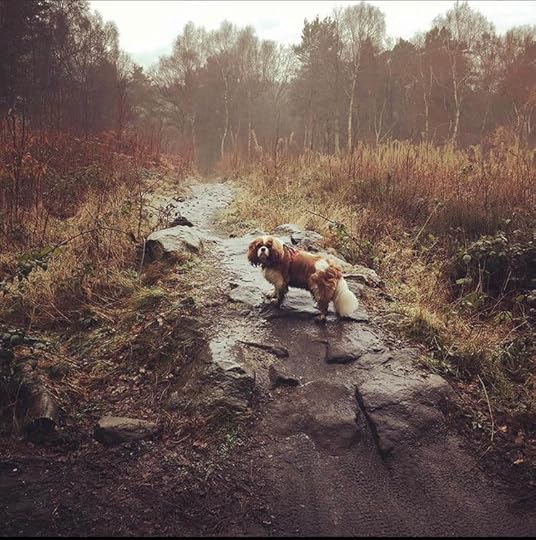 Those of you who know my books know I usually like to set them around coastal towns.
Those of you who know my books know I usually like to set them around coastal towns. But the sea isn't my only love. I adore forests too. For years, I've been staying in cabins in the middle of forests around the UK with my family including my dog. Watching tall pine trees swaying above me from a cabin's vast window can be just as therapeutic and inspiring as watching the sea ebb and flow before me.
One day, while sitting in one of those cabins looking out over the forest, an idea came to me. Not the plot, at first, but the idea of a community. A very tight-knit seemingly perfect community set around a forest. That community came to me fully formed, I even instantly knew its name: Forest Grove.
From there, characters started to spill out. A mother who adores her children and throws herself into the community that has been her sanctuary all her life. A successful businessman with aspirations of being a politician. Three children, each one different. A whole community of characters which felt so vivid to me, that I could almost see them walking through the trees ahead of me.
I honed in on the woman, Melissa. I thought about how fiercely she loves her children... like I love my little girl, Scarlett. And then the question popped into my head:
If she had a feeling one of her children had done something terrible, would she protect them?
What if that something involved hurting their own father, her husband?
And how far would she go to keep them safe from the police, from the community... and from themselves?
And so Wall of Silence was born!
I share more tit-bits like this and will also be doing a giveaway on my Facebook reading group, The Reading Snug. So if you haven't requested to join yet, please do!
Published on February 28, 2020 08:55
December 22, 2018
Real life echoes fiction
I was writing The Family Secret throughout the first half of 2018. It was particularly strange to be writing wintry scenes as spring began to make its appearance. But then something strange happened: it snowed! And this is a video I did on that day... And here's a bonus pic of my snowy dog to wish you a very happy Christmas and New Year! 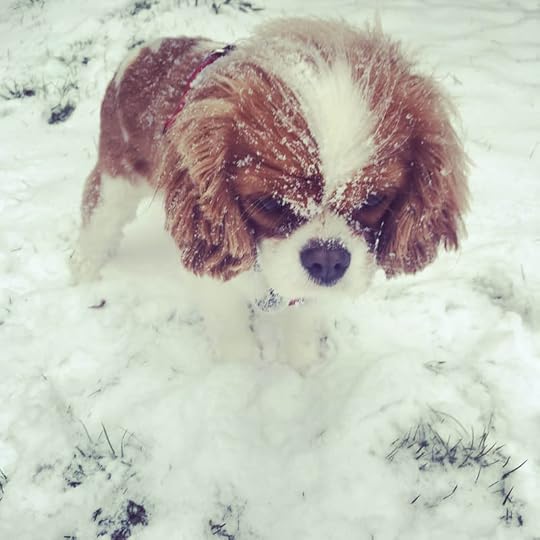

Published on December 22, 2018 16:00
December 21, 2018
Alum Chine: The Inspiration for Winterton Chine
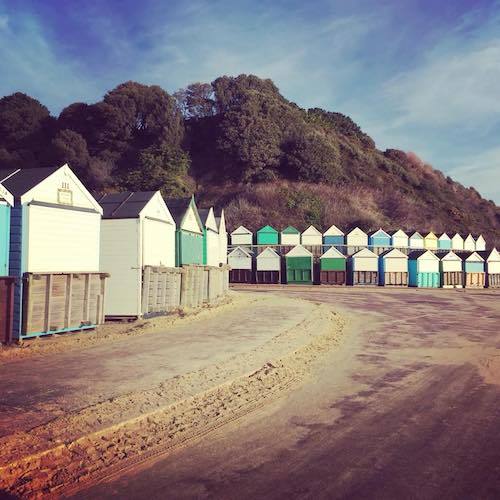 Back in Christmas 2017, I visited the pretty Alum Chine area of Bournemouth in the UK with my daughter and my mum. I'd already started writing The Family Secret /The Girl on the Beach, and knew I wanted to base the wintry out-of-season seaside town on Alum Chine. So as it's just a couple of hours' train ride way plus a Nordic Christmas market was being held there that year, what better excuse did I need to go?
Back in Christmas 2017, I visited the pretty Alum Chine area of Bournemouth in the UK with my daughter and my mum. I'd already started writing The Family Secret /The Girl on the Beach, and knew I wanted to base the wintry out-of-season seaside town on Alum Chine. So as it's just a couple of hours' train ride way plus a Nordic Christmas market was being held there that year, what better excuse did I need to go? Did I also mention I stayed in a chocolate hotel? Yeah, really! I'd like to say that was an essential part of the research but truth is, I just love chocolate!
It was great being able to walk around and take in the atmosphere. I think British seaside towns have a different quality during the winter. Quiet, calm, cold! I needed to get a sense of what Amber, the gift shop owner who discovers a girl walking on the beach barefoot, saw, felt, smelt and tasted during those cold sparse winter months.
It was also a great way to get me in the Christmas mood. A lot of the scenes in The Family Secret are based during the festive period. Don't let that fool you into thinking this winter tale is full of joy and laughter. Frozen deathtrap lakes, chilling family secrets and wintry heartbreak are all included too. This is a Tracy Buchanan novel after all!
See a gallery of pics from my travels to Alum Chine below. If you want to order The Family Secret here or in the US, click here.
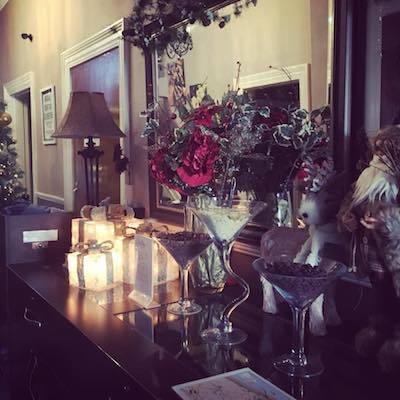
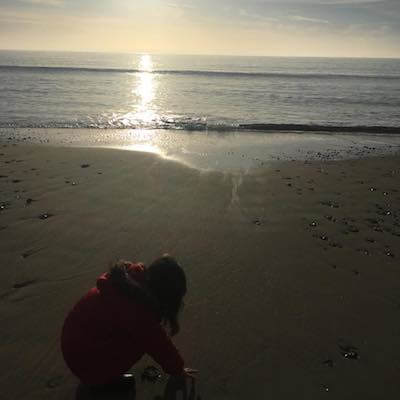
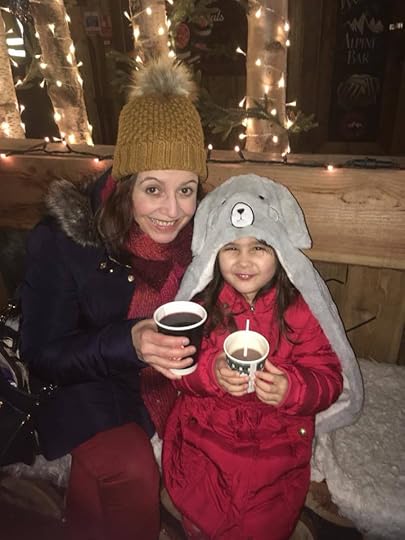
Published on December 21, 2018 16:00
December 20, 2018
Alum Chine: The Inspiration for Winterton Chine
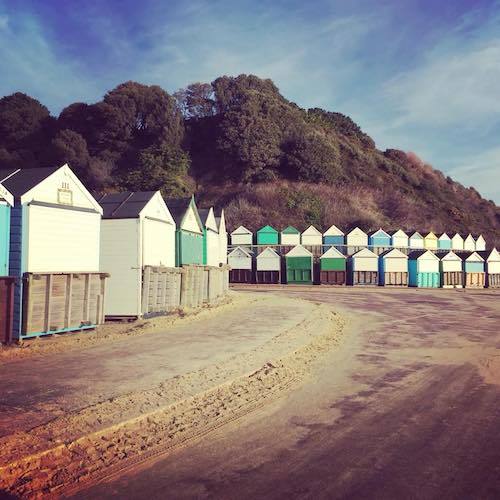 Back in Christmas 2017, I visited the pretty Alum Chine area of Bournemouth in the UK with my daughter and my mum. I'd already started writing The Family Secret /The Girl on the Beach, and knew I wanted to base the wintry out-of-season seaside town on Alum Chine. So as it's just a couple of hours' train ride way plus a Nordic Christmas market was being held there that year, what better excuse did I need to go?
Back in Christmas 2017, I visited the pretty Alum Chine area of Bournemouth in the UK with my daughter and my mum. I'd already started writing The Family Secret /The Girl on the Beach, and knew I wanted to base the wintry out-of-season seaside town on Alum Chine. So as it's just a couple of hours' train ride way plus a Nordic Christmas market was being held there that year, what better excuse did I need to go? Did I also mention I stayed in a chocolate hotel? Yeah, really! I'd like to say that was an essential part of the research but truth is, I just love chocolate!
It was great being able to walk around and take in the atmosphere. I think British seaside towns have a different quality during the winter. Quiet, calm, cold! I needed to get a sense of what Amber, the gift shop owner who discovers a girl walking on the beach barefoot, saw, felt, smelt and tasted during those cold sparse winter months.
It was also a great way to get me in the Christmas mood. A lot of the scenes in The Family Secret are based during the festive period. Don't let that fool you into thinking this winter tale is full of joy and laughter. Frozen deathtrap lakes, chilling family secrets and wintry heartbreak are all included too. This is a Tracy Buchanan novel after all!
See a gallery of pics from my travels to Alum Chine below. If you want to order The Family Secret here or in the US, click here.
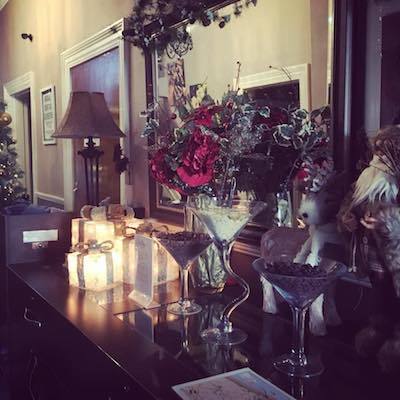
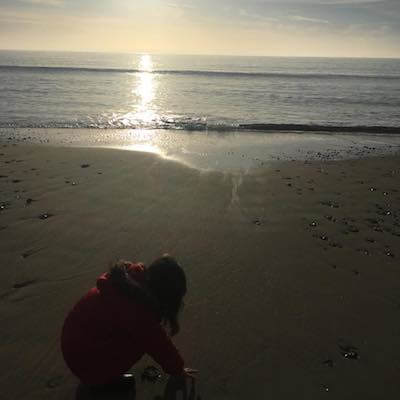
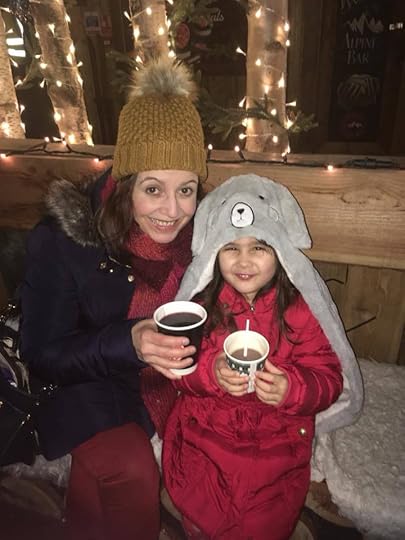
Published on December 20, 2018 03:19
Real life echoes fiction
I was writing The Family Secret throughout the first half of 2018. It was particularly strange to be writing wintry scenes as spring began to make its appearance. But then something strange happened: it snowed! And this is a video I did on that day... And here's a bonus pic of my snowy dog to wish you a very happy Christmas and New Year! 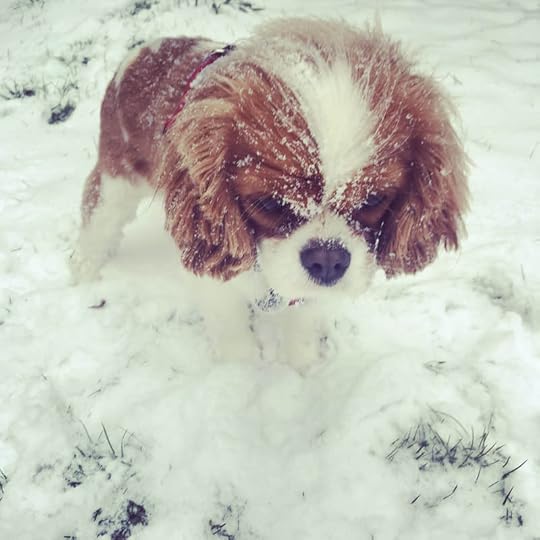

Published on December 20, 2018 03:19
December 12, 2018
The importance of location in my writing
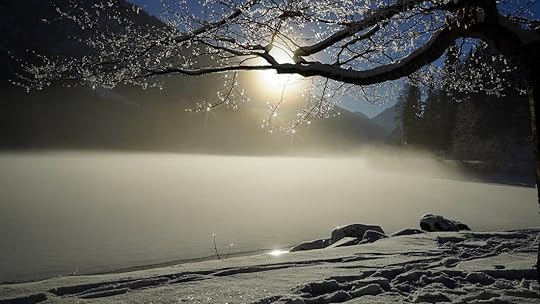
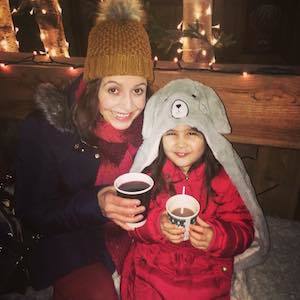 Location always plays an integral role in all my novels, whether it be the ravished shores of Thailand during the 2004 tsunami in The Atlas of Us or the eerie underwater world of submerged forests in My Sister’s Secret.
Location always plays an integral role in all my novels, whether it be the ravished shores of Thailand during the 2004 tsunami in The Atlas of Us or the eerie underwater world of submerged forests in My Sister’s Secret.And it’s no different with my latest novel The Family Secret (The Girl on the Beach in the US), which is set in several locations such as a wintry British seaside town, a stunning loch in Scotland and the ice beaches of Iceland.
Location is so crucial for building tension and atmosphere. Here are five ways I do that:
1. Use all the senses
I learnt this one while working as a travel journalist. It’s not just about what you see, but also what you hear, smell, taste and touch.
Take a Scottish lodge that features a lot in The Family Secret, for example. This is how wildlife documentary maker Gwyneth experiences it the first time she walks in:
'I was instantly struck by the contrast between the house’s chilly exterior and warm interior: inviting oak panelling, the smell of an open fire and Christmas spices, the delicious warmth of its air compared to the icy white setting outside. A large patterned rug lay in the middle of the hallway, and two wooden stairways swept up towards a balconied landing. Another Christmas tree stood at the back of the hall, so high the star at the top reached the top of the railing on the balcony. A stag-antler chandelier hung from the ceiling on chains, golden lights glistening. It was just Dylan and I in the hallway, but I could hear talking in the distance, laughter, the faint trace of Christmas music tinkling from speakers. I could also hear people walking around on the floorboards above me.'
As you can see, I used all the senses so the reader feels they themselves have stepped into that lodge.
2. Bad things can happen to beautiful places
I love writing about beautiful places which have something rotten beneath the surface. In The Family Secret, that Scottish lodge looks like the perfect location for a festive gathering, perched on the stunning loch with snow-tipped mountains beyond. But that loch, despite its beauty, can also be a death-trap when iced over, as Gwyneth discovers the first time she's there and falls through the ice. As I write, the loch ‘shone beneath the moonlight, as menacing as it was beautiful’.
3. Don’t worry toooo much about weather clichés
Authors are always warned off using weather in obvious ways when writing, especially when opening up a novel. But when it comes to scaring the bejesus out of readers, clichés – especially weather clichés – can work to a writer’s advantage. In The Family Secret, I use the increasing snowfall to create a mounting sense of tension and claustrophobia. In fact, the whole season of winter is used to enhance the effect of the locations with the potential for cracking ice and stifling snowfall.
4. Treat location like a villainous character
Okay, confession time. I sometimes plan my novels using Excel. And in every Excel worksheet I set up for a novel is a section on characters. And in that section is where I place all my notes about the location of my novel because (and you’ll hear this from a lot of writers) I treat location like a character. In The Family Secret, location becomes the main characters’ friend and their foe. Like Winterton Chine, the pretty festive seaside village where gift shop owner Amber discovers a girl walking barefoot on the icy beach with no memory of who she is or where she came from. Amber loves the place, it’s where she grew up and lives. But equally, the town can be a constant reminder of difficulties in her past. That loch is also a character on its own with the potential to claim lives beneath its hard icy surface.
5. You don’t have to write what you know
Yep, it’s nice to have an excuse to go on a jolly and visit the places I write about... and many times I have. But it’s not essential. I’m a writer after all, I like to use my imagination! I hadn’t visited the submerged forests I described in My Sister’s Secret, for example. I did it from online research and pure imagination. It’s the same for The Family Secret. I haven’t yet been to Iceland, one of the main locations, but I know people who have so picked their brains about it and did lots of online research. The location of Winterton Chine is, however, based on the lovely Alum Chine in Dorset which I visited during the Christmas I started writing the novel. Any excuse for a mulled wine on the beach, I'm pictured here with my daughter during the visit!
Right, I think that’s it, I’m off to lie on my chaise lounge (yes, I really have one!) and imagine the world of my next novel…
To pre-order The Family Secret, click here.
Published on December 12, 2018 03:06



